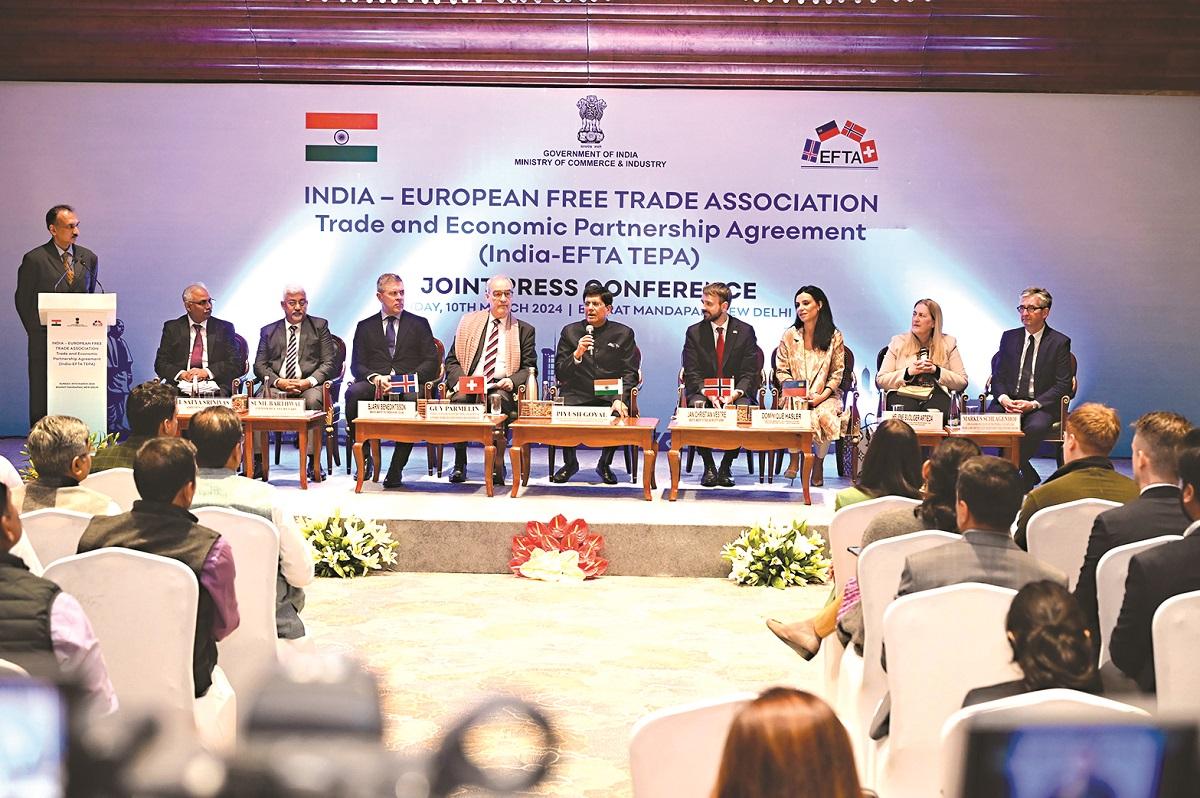
The India-European Free Trade Association (EFTA) Trade and Economic Partnership Agreement (TEPA) starts soon. It officially becomes effective on October 1, 2025. India signed the agreement on March 10, 2024, in New Delhi.
TEPA stands as a modern, ambitious agreement. It incorporates a powerful commitment unique among India’s Free Trade Agreements (FTAs). EFTA member states guarantee massive investment and job creation. They will increase Foreign Direct Investment (FDI) into India by $100 billion. This crucial investment will flow over the next 15 years. It will facilitate the creation of one million direct jobs in India. This commitment focuses specifically on long-term capital. It deliberately excludes Foreign Portfolio Investment (FPI).
Comprehensive Scope and Market Access
TEPA comprises 14 comprehensive chapters. These chapters focus on core trade areas. Key topics include market access for goods and services. The agreement also covers Intellectual Property Rights (IPR). It addresses trade facilitation and trade remedies. Rules of origin and investment promotion are crucial components. Finally, it ensures trade and sustainable development provisions.
EFTA includes Switzerland, Norway, Liechtenstein, and Iceland. Switzerland remains India’s largest EFTA trading partner. Norway closely follows in trade volume. The agreement empowers Indian exporters significantly. EFTA offers duty concessions on 92.2% of tariff lines. This covers nearly 99.6% of all Indian exports. EFTA fully eliminates tariffs on all non-agricultural products.
India also grants market access on many products. India’s offer covers 82.7 per cent of its own tariff lines. However, India protects its sensitive domestic sectors. These include dairy, processed food, and pharmaceuticals.
Boosting Services and Professional Mobility
The services sector will experience a major boost. TEPA stimulates exports in high-growth areas. These include IT, business services, and education. It also benefits cultural and audio-visual services.
The pact also includes Mutual Recognition Agreements (MRAs). These MRAs help Indian professionals. Architects, Chartered Accountants, and Nurses gain easier access to EFTA markets. India’s commitment covers 105 sub-sectors. Switzerland commits to 128 sub-sectors. Norway commits to 114 sub-sectors. Improved market access will happen through digital delivery (Mode 1). It also enables commercial presence (Mode 3). The agreement ensures greater certainty for temporary stay of key personnel (Mode 4).
Focus on Technology and Sustainability
TEPA assures full commitment to TRIPS-level Intellectual Property Rights (IPR). India’s generic medicine sector interests receive complete protection. The agreement also promotes sustainable development. It fosters inclusive growth, environmental protection, and social progress. TEPA facilitates technology collaboration. It provides access to world-leading technologies. These span precision engineering and health sciences. It includes renewable energy and Research & Development (R&D) facilities. This landmark agreement accelerates job creation. It positions India firmly on the global trade map as a reliable partner.

